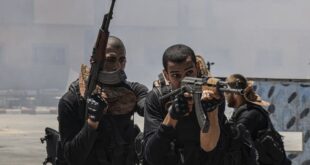KHARTOUM (AP) — President Omar Bashir has escalated his rejection of the United Nations deploying peacekeepers in Darfur, saying they would be neocolonialists and accusing “Jewish organisations†of pushing for their deployment.
His comments, made while a joint UN and African Union team is in Sudan to plan for such a deployment, are likely to increase tension with the UN Security Council and provoke an angry response from US legislators.
A Security Council delegation toured Darfur early this month. The US and Europeans have been pushing for a large UN force to take over peace keeping in Darfur from the African Union’s poorly equipped 7,000 troops who have been unable to halt the violence in the west Sudanese region.
“This shall never take place,†Bashir told reporters at a press conference with South African President Thabo Mbeki on Tuesday. “These are colonial forces and we will not accept colonial forces coming into the country.†“They want to colonise Africa, starting with the first sub-Saharan country to gain its independence. If they want to start colonisation in Africa, let them chose a different place,†he said.
However, Sudan already has 10,000 UN peacekeepers in its south, where they are helping to implement the January 2005 peace agreement that ended more than 20 years of civil war between the north and the south of the country.
When journalists pressed Bashir on his objection to UN troops in Darfur, he replied: “It is clear that there is a purpose behind the heavy propaganda and media campaigns†for international intervention in Darfur. “If we return to the last demonstrations in the United States, and the groups that organised the demonstrations, we find that they are all Jewish organisations,†Bashir said.
The president was referring to the rallies held in New York and Philadelphia earlier this year which were addressed by figures such as actor George Clooney and former basketball star Manute Bol, a Sudanese.
The comments were Bashir’s strongest rejection of a UN peacekeeping role in Darfur. On Monday, he said he himself would lead the “resistance†to such a force.
But his government has long showed reluctance to approve the deployment, saying the Darfur conflict should be dealt with by Africans. Officials and tribal leaders have often stirred up public opposition by painting the force as colonialist or prompted by Jewish or Israeli pressure.
In Cairo, Egyptian Foreign Minister Ahmed Aboul Gheit discussed Egypt’s support for peace in Sudan with Louis Michel, the European Commissioner for Development and Humanitarian Affairs. “It is necessary for Sudan to accept international presence which is a basic condition for the success of any process that aims at securing and maintaining peace in any country,†a foreign ministry statement released after the talks said.
Nearly 200,000 people have been killed and more than 2 million displaced in Darfur since members of ethnic African tribes rose in revolt against the Arab-led Khartoum government in early 2003. The government is accused of responding by unleashing Arab militias known as the janjaweed who have been accused of the worst atrocities.
But it denies any involvement.
The one rebel group that signed the May 5 peace accord for Darfur, the Sudan Liberation Movement, wants UN troops to be deployed.
“As far as security is concerned, I think they are the most capable forces,†Mohammed Eltijani Eltayeb of the Sudan Liberation Movement told the Associated Press on Wednesday in The Hague, where he was attending Dutch-hosted talks on reconstruction.
A leading government opponent, Hassan Turabi, has said the government opposes the United Nations in Darfur because the world body has vowed to prosecute all those involved in war crimes. “They are afraid of the UN’s efficiency. The government fears that too many of its allies will end up in an international criminal court,†said Turabi, who is believed to be influential with one of the Darfur rebel groups.
Last week, a prosecutor for the International Criminal Court reported to the Security Council that a “significant number†of massacres, in which hundreds of people were killed at a time, had occurred in Darfur and certain tribes had been singled out for attack. In his report, Moreno Ocampo said Sudan’s courts had shown little desire to investigate alleged crimes against humanity.
Bashir’s government has refused to hand over any Sudanese for prosecution by the ICC in the Hague.
The UN team in Sudan is led by the world body’s top peacekeeping official, Undersecretary General Jean-Marie Guehenno, who is scheduled to give a press conference at the end of his visit on Thursday.
Jan Pronk, the top UN envoy in Sudan, said in a statement Wednesday that Guehenno and the Security Council delegation had stressed that “the United Nations will not intervene in the country,†nor will it deploy troops, without the consent of the Sudanese government.
 Eurasia Press & News
Eurasia Press & News
